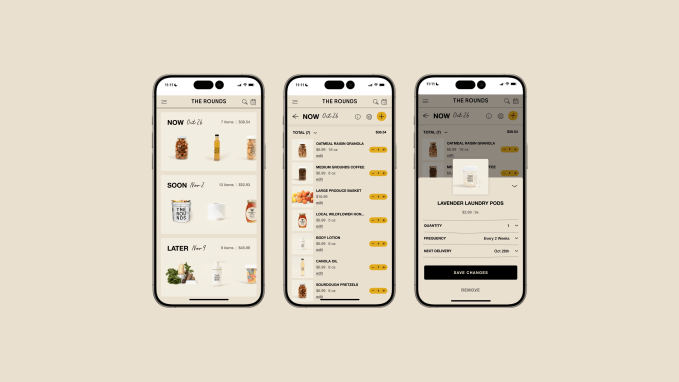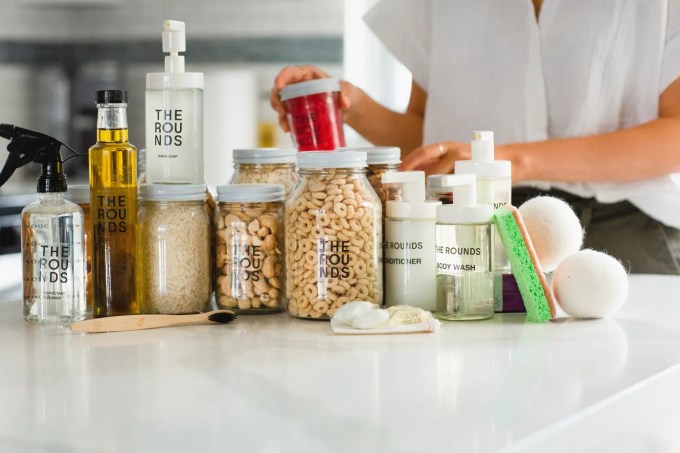How ‘household restocking’ startup The Rounds uses tech and AI to make sustainable e-commerce profitable
The Rounds, a sustainable “household restocking” service, wants to prove that last-mile logistics can be done both efficiently and profitably. Now, it’s claiming a significant milestone on the latter, as the startup claims it’s profitable not only at the unit economic level but also in terms of how it operates its fulfillment centers — the neighborhood locations from where it delivers inventory — like grocery items and household goods — and dispatches staff to fill customers’ orders.
“Being able to hit profitability there means the next step is true cashflow positive, and we’re making really good progress towards that,” The Rounds co-founder and CEO Alex Torrey tells TechCrunch.
Launched in 2019 in Philadelphia, and now available in D.C., Miami and Atlanta, The Rounds allows customers to shop from across 650 SKUs, up from 150 just a year ago. These cover a range of products, including household items, personal care, pantry staples and dry goods, in addition to items from select local sellers or co-ops, including bakeries, coffee roasters, florists or those who sell cheese, milk or eggs. In Miami, alcohol delivery is also available.
Customers sign up for the service, and for $10 per month, they can choose to restock their household’s needs — while also dramatically cutting down on plastic and packaging waste.

Image Credits: The Rounds
That’s because The Rounds’ business model involves delivering your items in reusable bags and containers. So instead of receiving your Instacart order in a dozen plastic bags on your doorstep, you receive your order in reusable shopping bags or cooler bags for the cold items. In addition, the items themselves come in reusable packaging — like mason jars or glass soap dispensers, for example. When you’re out, you place those containers in the bag on your doorstep where it’s picked up, washed and then re-used for future orders. For instance, your glass soap dispenser is refilled at the local hub from 50-gallon drums, and then returned.
In total, around 70% of the products The Rounds sells are in reusable packaging.
Since closing its $38 million Series A last year, The Rounds has saved 375,000 pounds of packaging waste, Torrey notes. In addition, The Rounds’ revenue has increased 6x during that time, he says, as the service has become more efficient.
“We now average between 15 and 18 deliveries per hour…that’s like UPS-level,” the CEO notes. This scale has been achieved, in part, by targeting specific urban ZIP codes where the service is accessible by 3.3 million households across its four markets, or a total of 8.6 million people. Within those ZIP codes, The Rounds targets apartment buildings to help it achieve density, making it easier to reach higher deliveries per hour metrics.
At present, the service has north of 10,000 paying subscribers — a figure that could be impacted by the service’s price.
“It is not the cheapest,” Torrey admits. “You can go to discount grocers or lower-price grocers to buy conventional goods that are lower in price,” he says. “But we’re also not a premium.” That is, The Rounds is not marking up items over retail to make ends meet, as Instacart often does. “We sell you premium products at the market price, no markup, and we bring it to you and put it in reusable packing.”
The longer-term goal is for The Rounds to get even smarter about what its customers need. This plan, which Torrey refers to as the “psychic home manager,” would eventually be able to determine what the customer needs to restock and when, so there’s no food and inventory waste, either. This part of The Rounds’ business could be aided by AI.
Already, AI is helping maximize the efficiency of The Rounds’ delivery routing and is now powering its recommendation engine that offers smarter suggestions of what to buy next, which helps increase average order value.
In time, AI should help The Rounds predict what the customer needs.

Image Credits: The Rounds
“The idea of building your ‘psychic home manager’ has been like our North Star,” explains Torrey. And, he adds, “implicit in ‘psychic’ is AI — it’s how do we have a prediction engine?”
“In the beginning, we had very limited ability to make predictions, let alone use any kind of machine learning or sophisticated algorithms. We had very, very basic algorithms that were helping us make those predictions,” Torrey continues.
Since its Series A, The Rounds has 10x’d its ability to make predictions with more powerful algorithms and true AI, Torrey says. “We’re not there yet…but we’re much, much closer to delivering that ‘psychic home manager’ experience,” he adds.
The company has achieved its fulfillment level profitability milestone and revenue growth while keeping its team lean. Though The Rounds, like other startups, did conduct layoffs last year, impacting GMs in local markets and other organizational changes, the current team is less than 50 people. The team also includes delivery personnel who are not contractors, but full-time hourly employees with benefits.
The hope, Torrey says, is that The Rounds’ progress can drive more sustainable e-commerce.
“Despite being the largest consumer spend category, e-commerce has been stuck the last 30 years — Amazon started in 1994 — with last-mile logistics that still runs on a single rail with single-use packaging,” the founder says. “We’re excited about proving that two-way last-mile logistics can in fact be done hyper-efficiently to be both profitable and good for the planet.”
